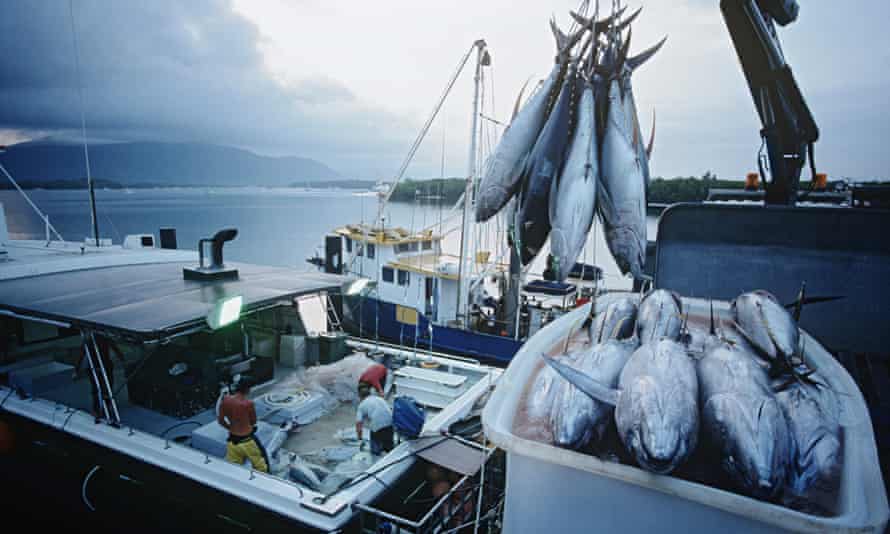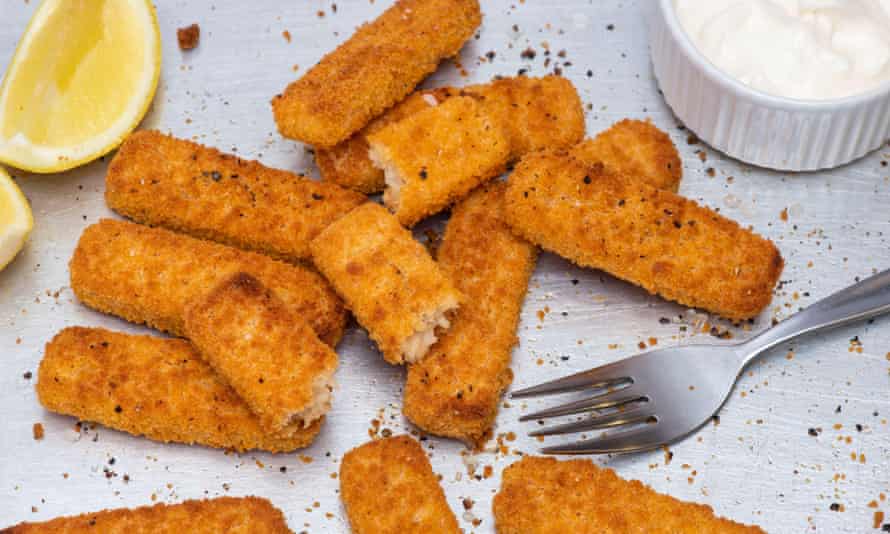Faux fish: vegan alternatives set to take UK market by storm | Vegan food and drink
It is seafood but it does not involve fishing nets or the sea, with plant-based filet-o-fish burgers, smoked salmon and prawns the next big thing in alternative protein.
Dubbed faux fish, a raft of new products are going on sale as new manufacturing techniques produce lifelike prawns from peas and flaky fish fillets from jackfruit.
Analysts describe the alt-seafood scene as “hot”, as companies spurred on by booming sales of plant milks and meat substitutes pour investment into the area. The focus on fish alternatives has also increased due to heightened consumer concern about overfishing, which has been spurred on by the popular Netflix documentary Seaspiracy.

Tesco, which works with the American chef and self-proclaimed “plant pusher” Derek Sarno, is set to expand its plant-based range with a handful of new products including Thai-style fish cakes and New England-style crab cakes.
The Dutch brand Vegan Zeastar has thrown down the gauntlet with its ambition of “veganising every dish that involves fish to fight the destruction of our oceans”. Its latest product is smoked “Zalmon”, made from tapioca starch, that looks uncannily like the real thing and is due to go on sale early next year. Its Shrimpz and Kalamariz are stocked online including by Ocado.
The fact that the food industry is getting serious about the area was highlighted by this month’s launch of Vrimp by Nestlé. Made from seaweed and peas, they promise the “authentic texture and flavour of succulent shrimps”, with the lookalike created using special moulds with a fine seam on the body the only giveaway.
Nestlé, the world’s biggest food group, has 300 people working on plant-based foods. Mark Schneider, its chief executive, said there had been a “significant shift” towards plant-based eating across all age groups.
“This is not just a one season fad,” said Schneider. “This is something that has very solid, longer-term growth rates.” He said people were interested in plant-based foods for different reasons. “With fish it is more health-related, and with beef and chicken it is more about the environment,” he said.
For Britons trying to reduce their environmental footprint, eating plant-based food is becoming more palatable because alternatives to meat and dairy today are so good, according to Schneider. Ahead of the Cop26 climate summit, he said consumer behaviour was a “big part of the equation” because making choices that lowered their carbon footprint was “easier than trying to get the carbon out of the existing products we consume”.
To date, a lot more time and money has been devoted to creating plant-based burgers and nuggets because the markets are so much bigger for beef and chicken. Another factor is that restaurants make up a substantial share of fish and seafood sales. When eating out, taste and experience were more important, making it more difficult for alternatives to be on par, said Thijs Geijer, a senior economist at ING.
Geijer said the huge variety in taste and texture within fish meant companies had to “invent the wheel” for a large range of products, with some of them – mainly startups – focused on tuna, which is sold in vast quantities in supermarkets. Nonetheless the category was “hot”, he said.

Sarno, who co-founded Wicked Kitchen and Good Catch and now heads up plant-based innovation at Tesco, believes alt-seafood can taste just as good as the real thing. Lots of seafood items were blended, coated and either baked or fried and were “easily made plant-based with no compromise”, he said. Tesco’s newly stocked products, which include Quorn fishless fingers and a fish burger, would be keenly priced, he said, so would offer customers with “easy swaps”.
On Friday and Saturday the first Plant Based World Europe show was held in London. It was the first trade event of its kind in Europe and more than 100 companies were involved. Jennifer Pardoe, a member of the steering committee who is also the co-founder of Jack & Bry,which developed the fish burgers sold in the Lewis Hamilton-backed Neat Burger chain, said fish was an exciting area because consumption was unsustainable, with the issue brought home to young people this year by Seaspiracy.
For faux fish to really take off, Pardoe said it needed to make it on to menus in high-profile fast food chains and restaurants so consumers could try it first, that way paving the way for supermarket sales. Taste would win out, she said. “You have got to make sure the fish flavour tastes authentic, if there are any off notes, or it tastes fake, people will call it out.”
Faux fish of the day
Vrimp – a plant-based take on shrimp (or prawns depending where you live) is the latest high-profile offering from Nestlé. Made from seaweed, peas and konjac root and shaped using specialist moulds, it is being trialled in its native Switzerland first.
Filet-no-Fish – The British brand Jack & Bry created the £8 filet-no-fish burger sold in the Lewis Hamilton-backed vegan chain Neat Burger. It mimics the taste of cod but is made of jackfruit marinated in seaweed.
Vuna – Tuna is another member of the “big five” most commonly eaten in the UK. Nestlé launched Vuna, made out of pea and wheat protein, last year but it is not yet on sale in the UK. You can buy “tuna-style flakes” from Good Catch, and canned tuna made by the brand unMEAT is coming too.
Smoked Zalmon – The Dutch brand Vegan Zeastar is set to add smoked Zalmon to a range that already includes Shrimpz, Kalamariz and Codd. This realistic-looking take on the upmarket treat is made from tapioca starch, flax and rapeseed oil and a “whole lot of plant-based love”.
Source: theguardian.com

